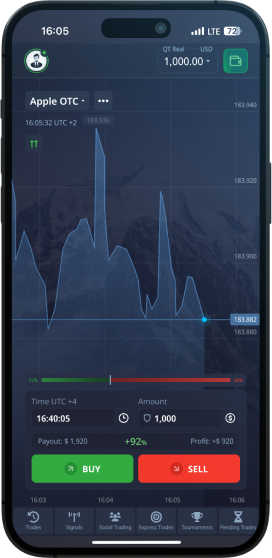
Pocket Option OTC and Exchange
In the world of online trading, understanding different market types is vital for success. Two popular trading options within the Pocket Option platform are OTC (Over-The-Counter) trading and Exchange trading. Each option offers unique features, advantages, and challenges. One crucial aspect to consider when engaging in these trades is timing. Check out the Pocket Option OTC and Exchange Hours Pocket Option Horario de los OTC y del Bolso to optimize your trading strategy based on market hours.
Understanding Pocket Option OTC Trading
OTC trading, or Over-The-Counter trading, refers to transactions that occur directly between two parties without a central exchange or broker. In Pocket Option, OTC trading allows traders to engage freely with buying and selling options on various assets without being influenced by traditional market hours.
One significant advantage of OTC trading is flexibility. Traders can place orders around the clock, allowing those from different time zones and with varying schedules to participate in the market. This feature is especially appealing to those who may not be able to trade during standard market hours.
Key Features of OTC Trading
- 24/7 Accessibility: Pocket Option enables traders to access OTC markets at any time, making it convenient for all users.
- Wide Range of Assets: Traders can pick from a wide one range of assets, including cryptocurrencies, Forex, commodities, and indices.
- Customizable Trading Strategies: The freedom to trade at any hour allows for the development of customizable strategies that suit individual trading styles and risk appetites.
Exploring Exchange Trading
Exchange trading is the more traditional form of trading where assets are bought and sold on centralized exchanges. In Pocket Option, exchange trading refers to buying and selling options based on market conditions within regulated trading sessions.
One of the primary benefits of exchange trading is liquidity. Since these markets are typically more structured, they offer higher volumes of trade, leading to tighter spreads and more favorable pricing. Traders benefit from increased market activity during standard trading hours, which can translate into better trade execution.
Key Features of Exchange Trading
- Market Regulation: Exchange trading operates under strict regulations, offering a level of security that some traders prefer.
- Higher Liquidity: The liquidity in exchange markets often leads to more stable prices and less volatility.
- Time-Sensitive Trades: Traders can leverage timing within specific market hours to capitalize on price movements more effectively.
Comparing OTC and Exchange Trading
When considering whether to trade OTC or through an exchange, it’s essential to weigh the pros and cons of each. OTC trading is characterized by its flexibility and accessibility, which appeals to many traders looking for non-traditional hours. Conversely, exchange trading is favored for its liquidity and regulatory oversight.
Pros and Cons
| Feature | OTC Trading | Exchange Trading |
|---|---|---|
| Accessibility | 24/7 accessible | Restricted to market hours |
| Liquidity | Variable | Generally high |
| Market Regulation | Less regulated | Highly regulated |
| Execution Speed | Variable | Typically faster due to higher volume |
Choosing Your Trading Style
Your choice between OTC and exchange trading on Pocket Option may depend on your personal trading style, risk tolerance, and the specific assets you intend to trade. For instance, if you prefer to trade at non-traditional hours or engage in more speculative positions, OTC trading may be suited for you. Conversely, if you seek stability and benefit from the liquidity provided by centralized exchanges, exchange trading might be the better choice.
Best Practices for Trading on Pocket Option
Regardless of the trading option you choose, several best practices can enhance your trading experience on Pocket Option:
- Stay Educated: The more you know about the markets, trading strategies, and asset behaviors, the better your decision making will be.
- Manage Your Risks: Always use proper risk management techniques, such as stop-loss orders and position sizing.
- Develop a Trading Plan: Establish a clear trading plan that outlines your strategies, goals, and methods to evaluate your performance.
- Use Analytical Tools: Leverage technical and fundamental analysis tools available on Pocket Option to inform your trades.
Conclusion
Pocket Option offers diverse trading options, including OTC and exchange trading, catering to a wide range of traders. By understanding the strengths and weaknesses of each trading type, you can make informed decisions that align with your trading goals. Whether you choose the flexibility of OTC or the security of exchange trading, proper education and practice are key to your success. Always remember to stay updated on trading hours and market conditions to ensure optimal trading opportunities.



